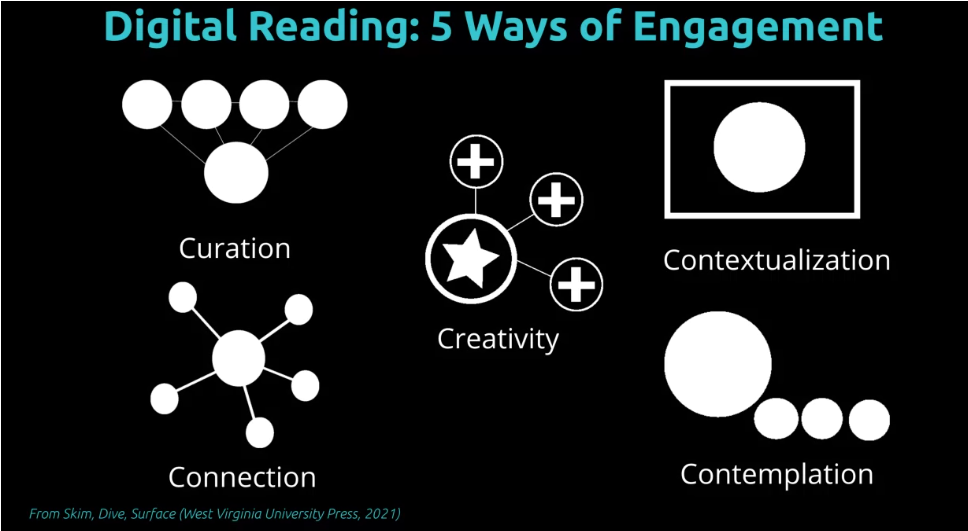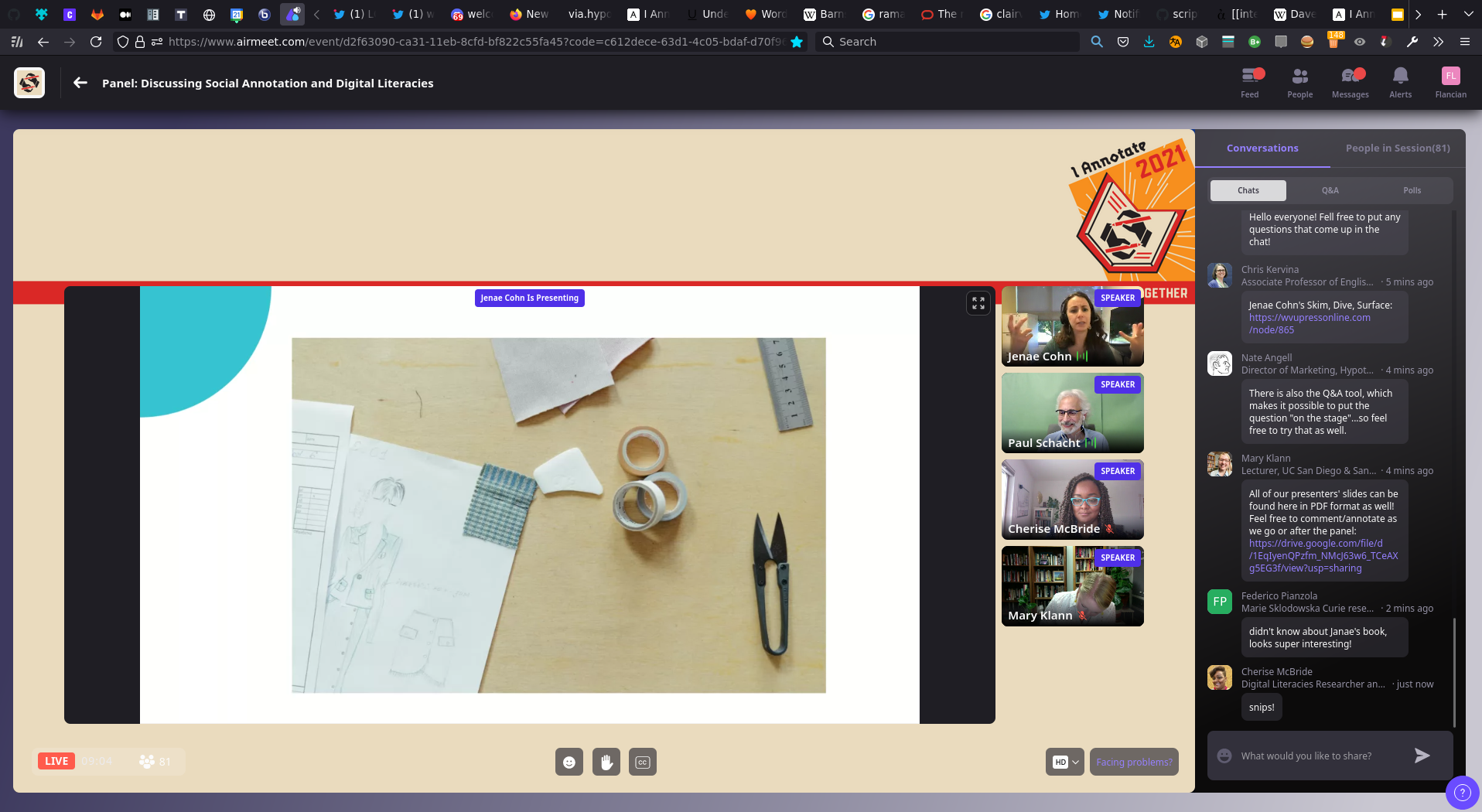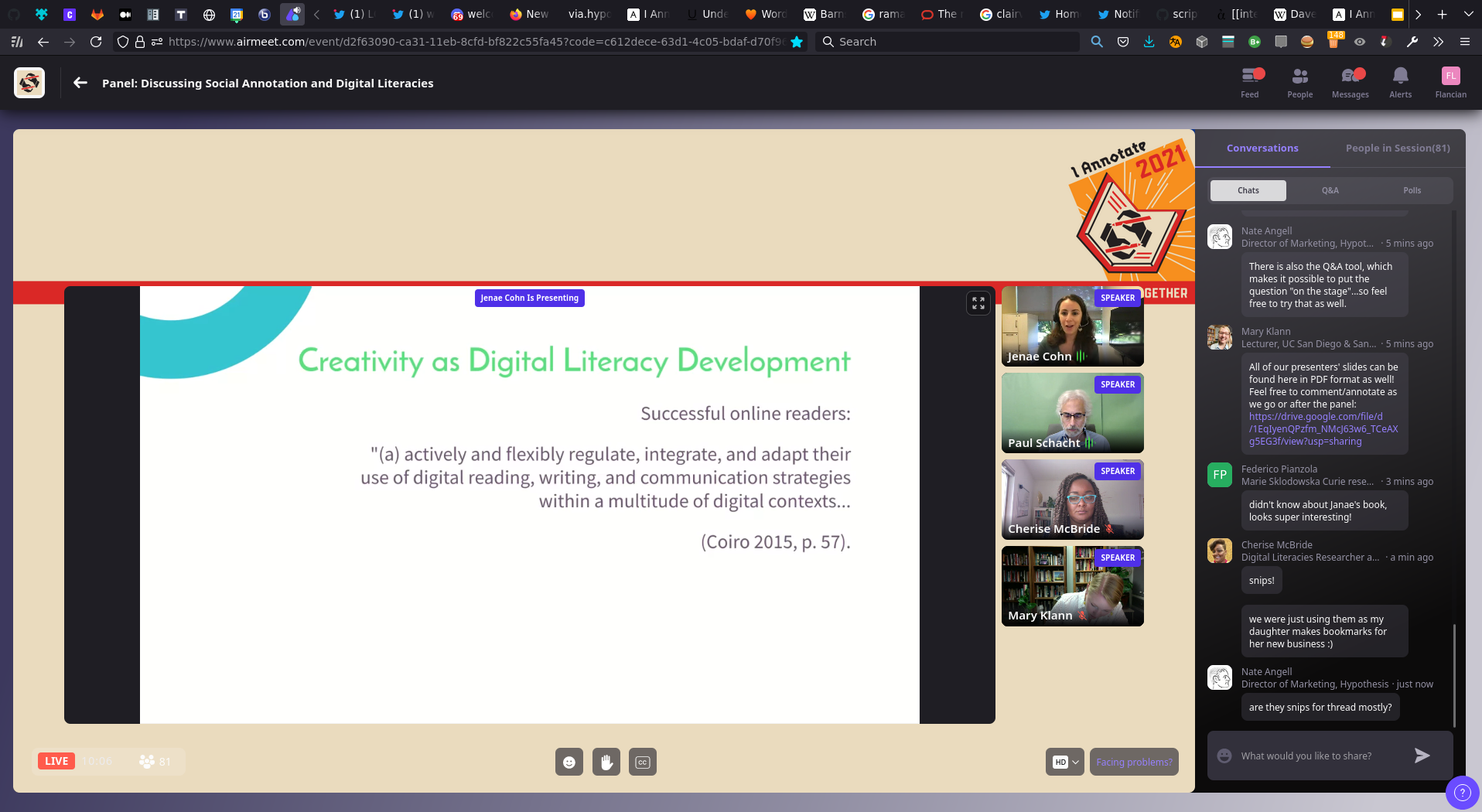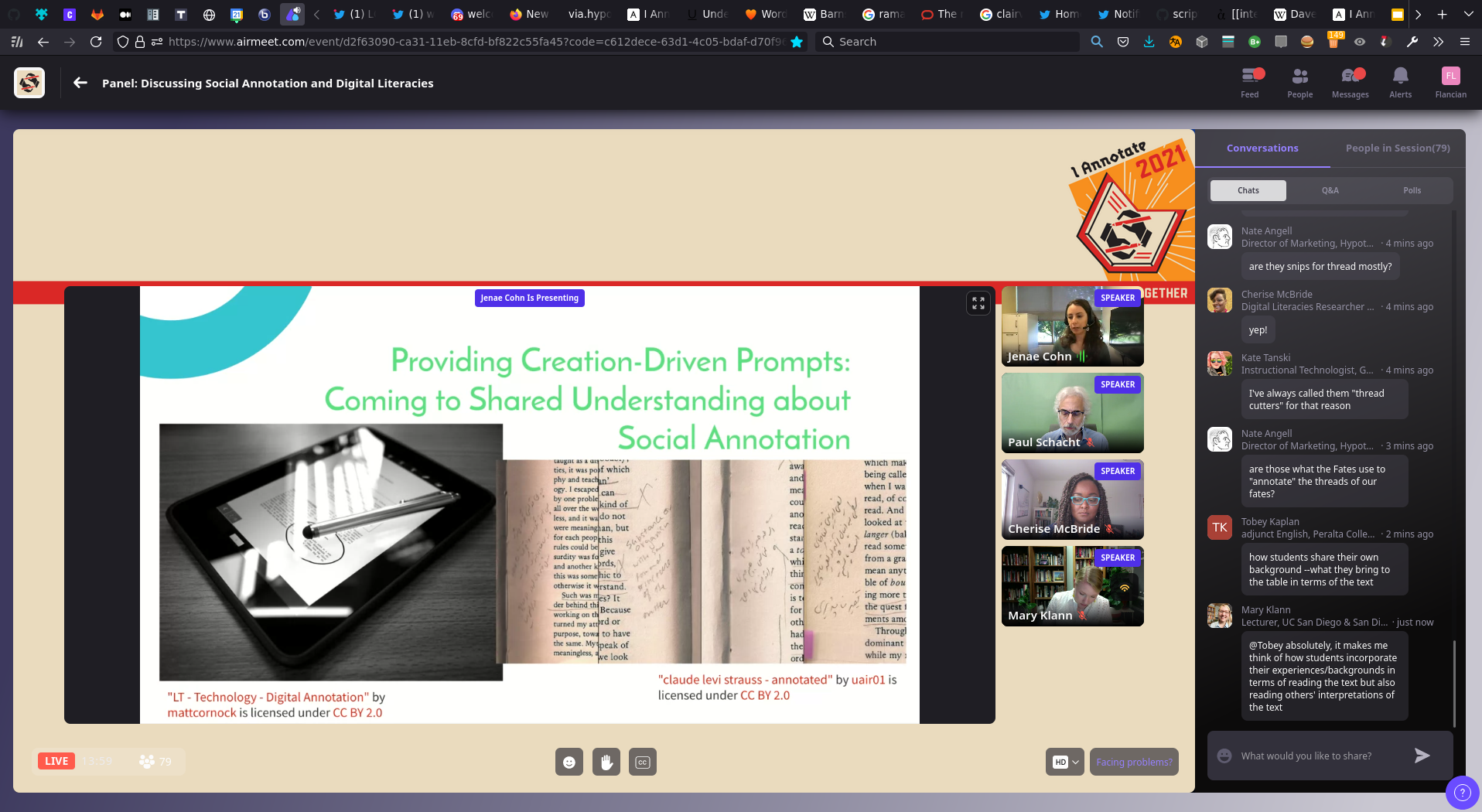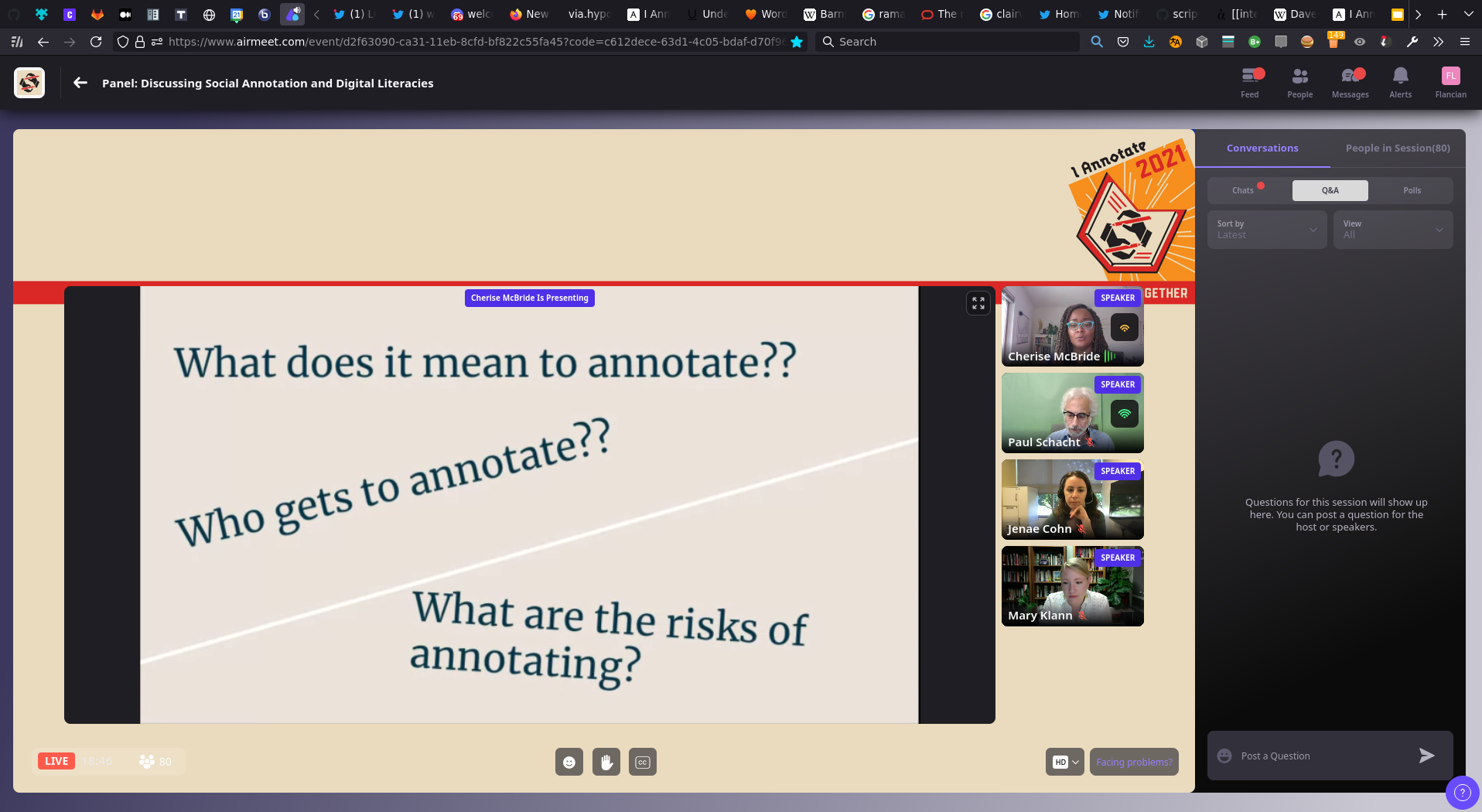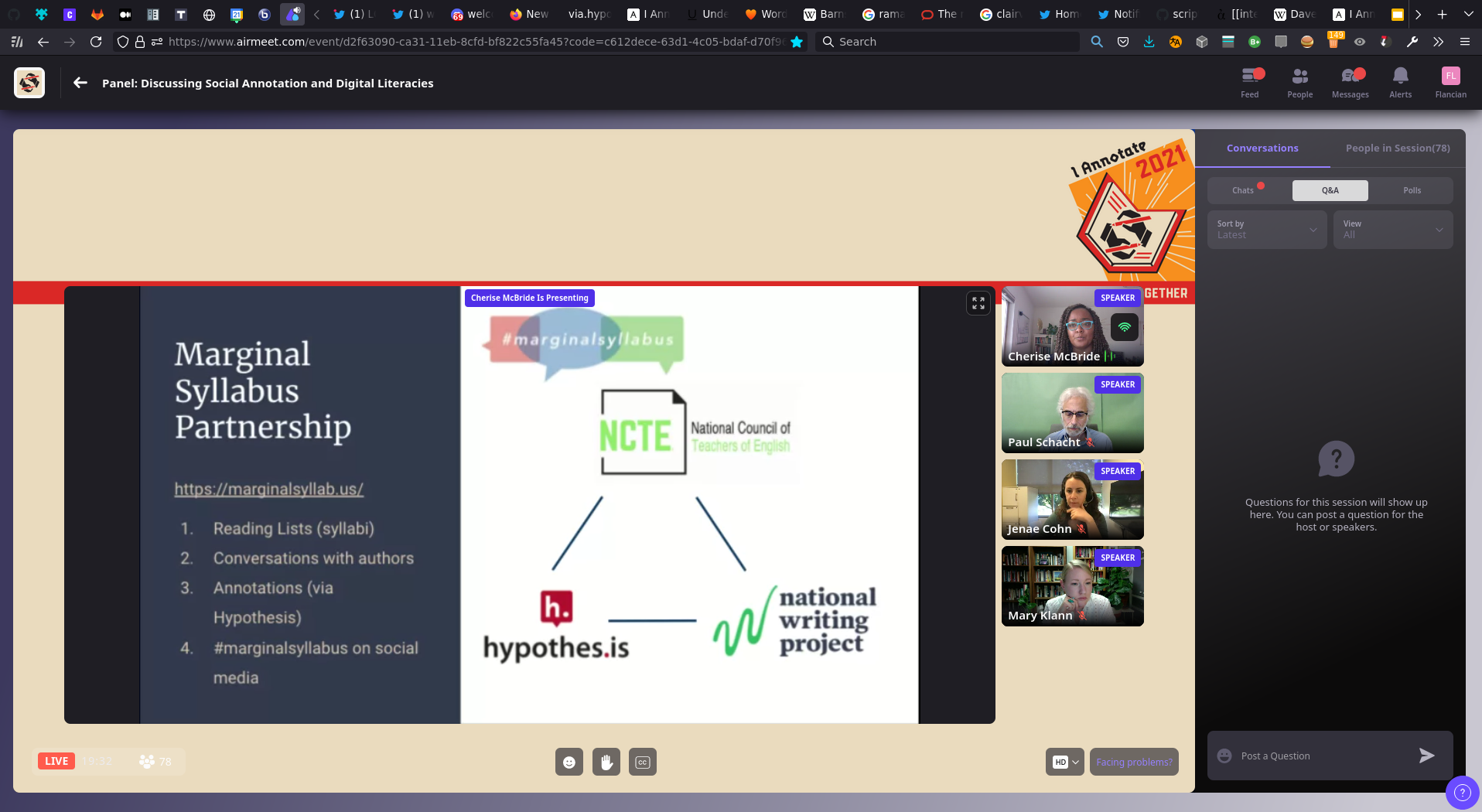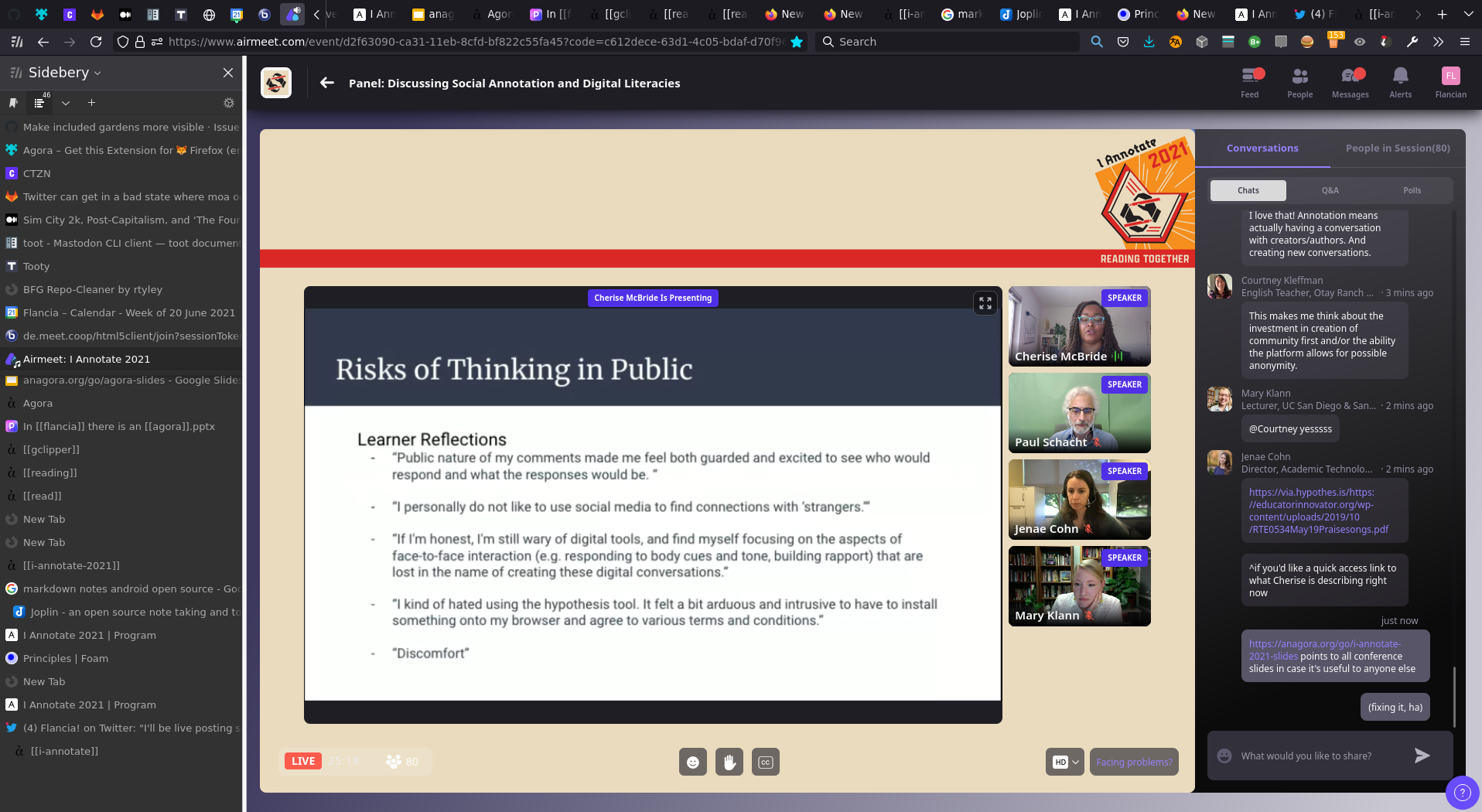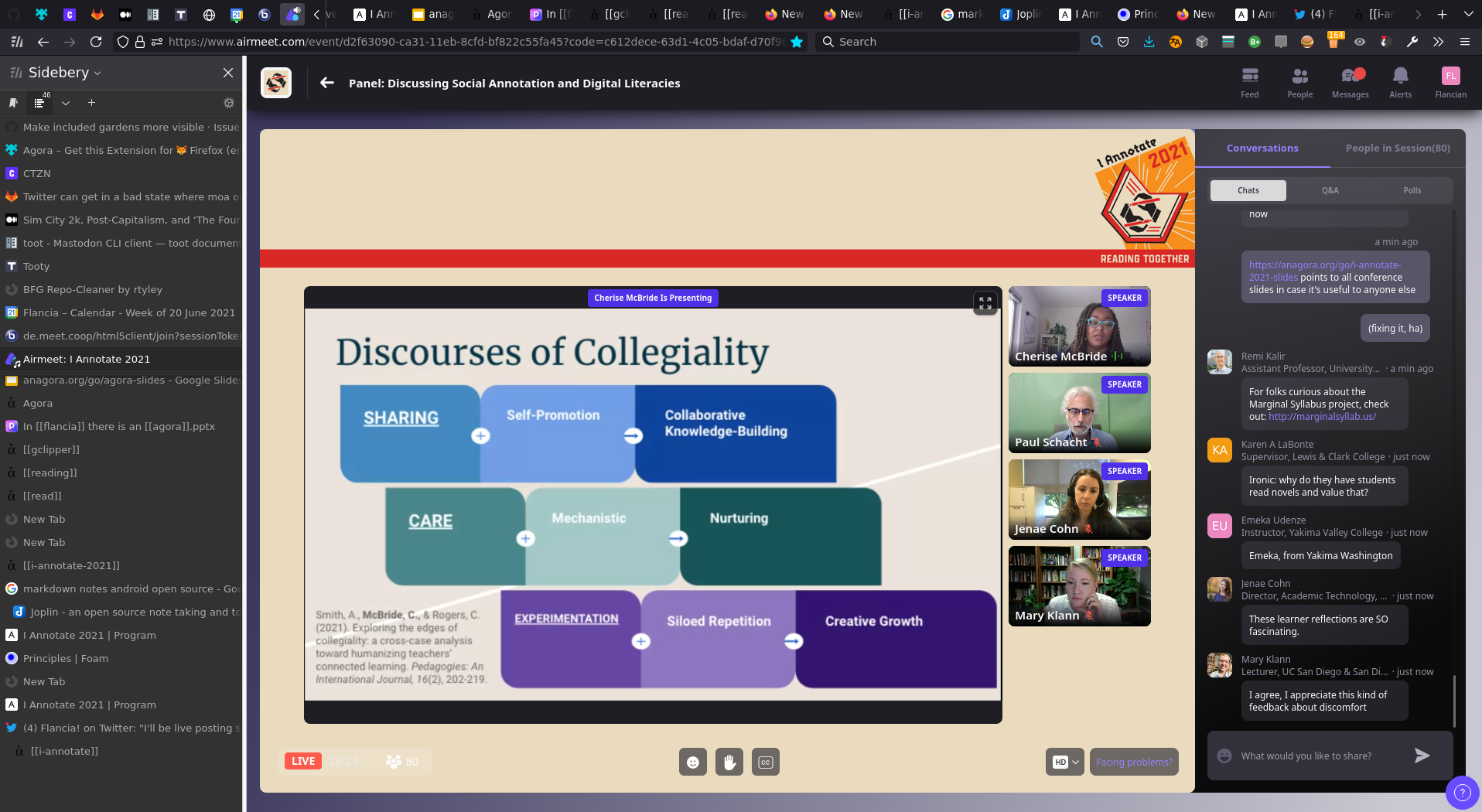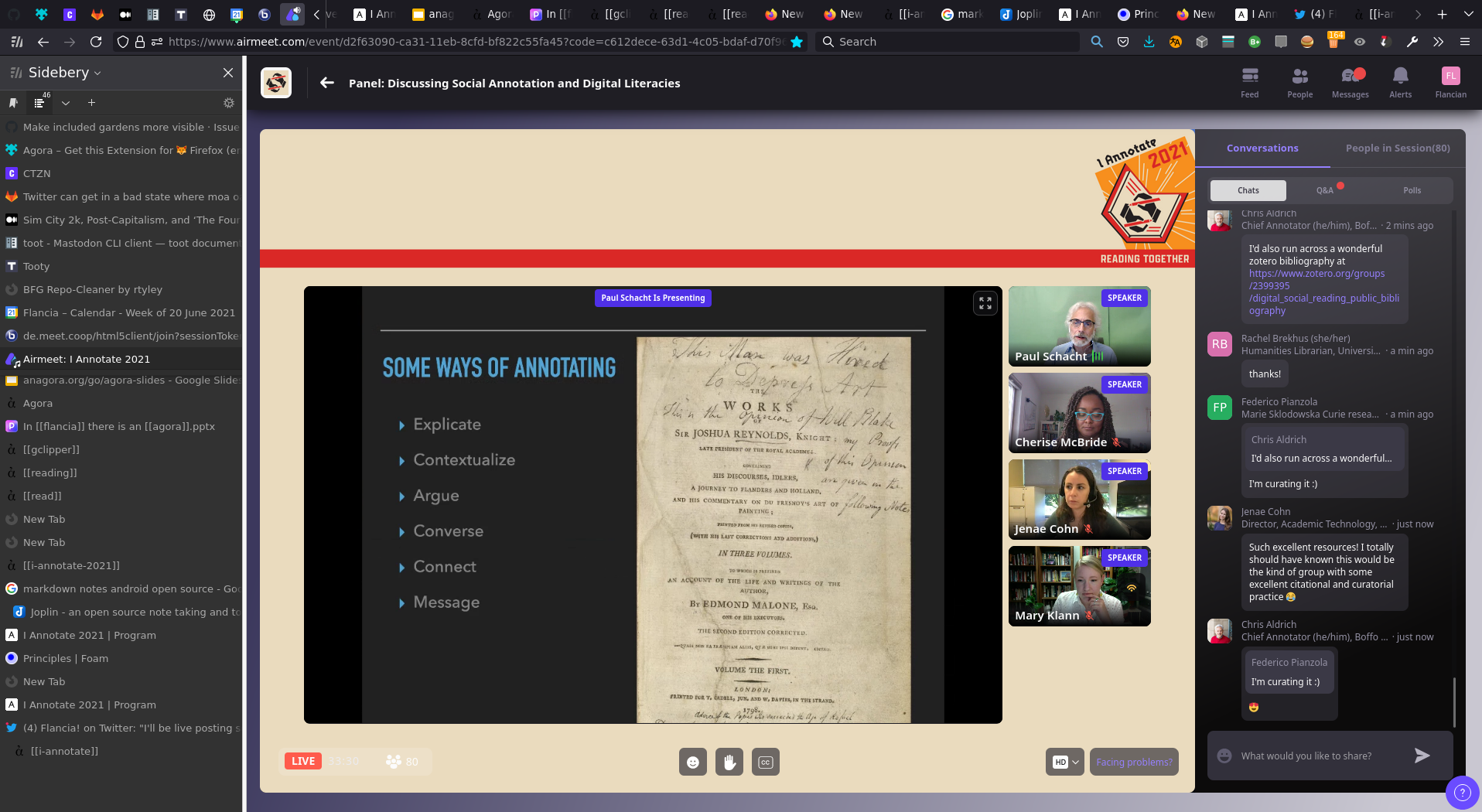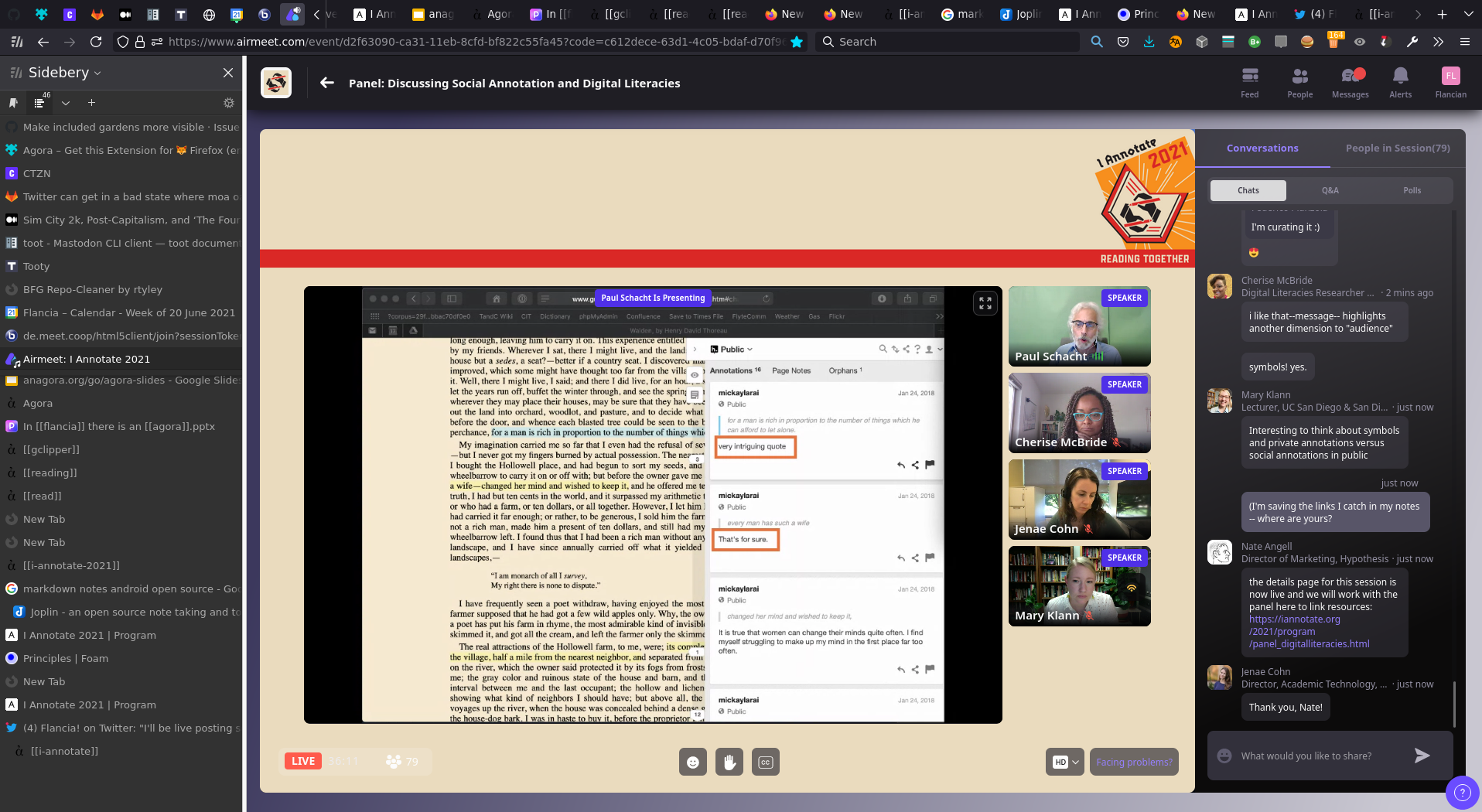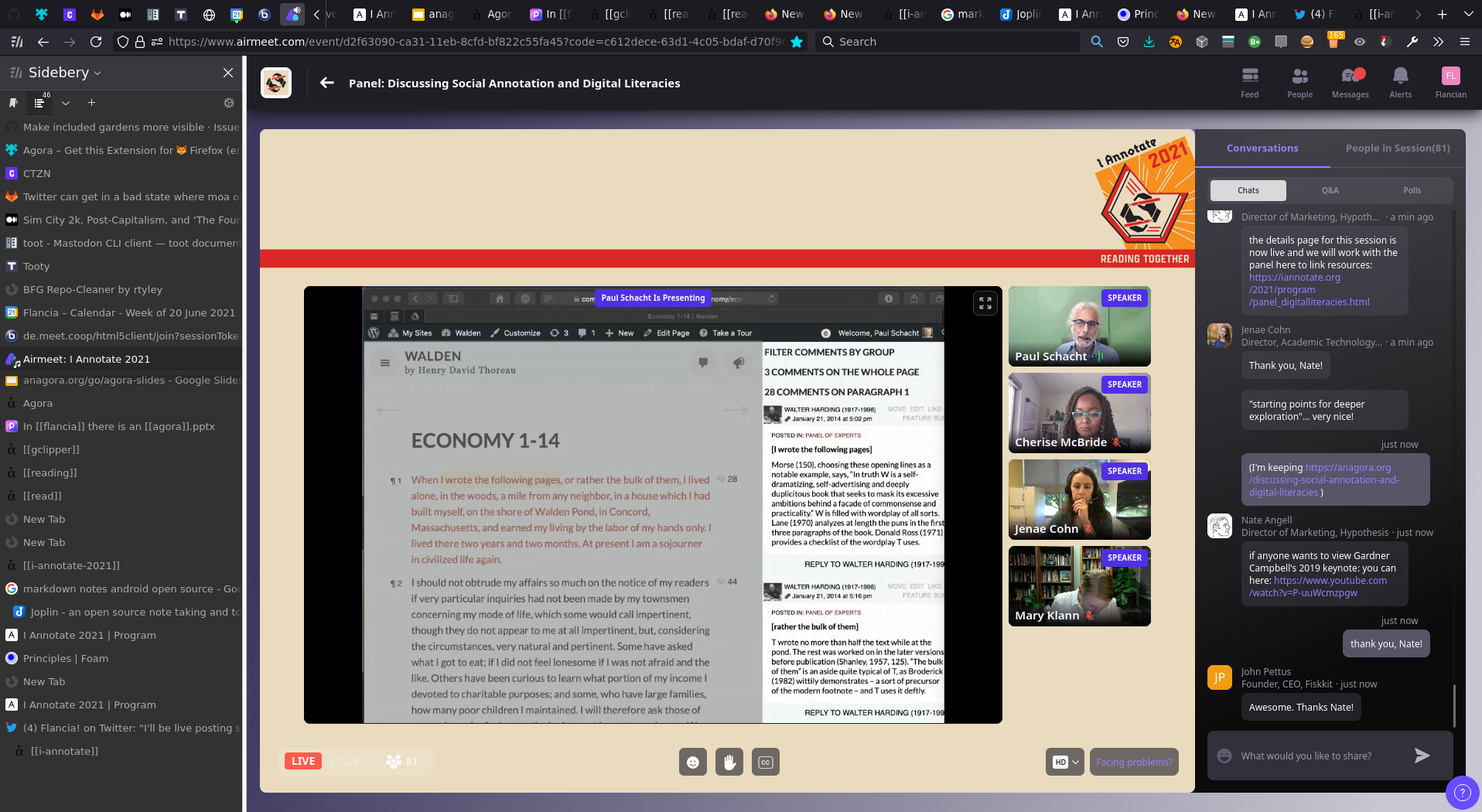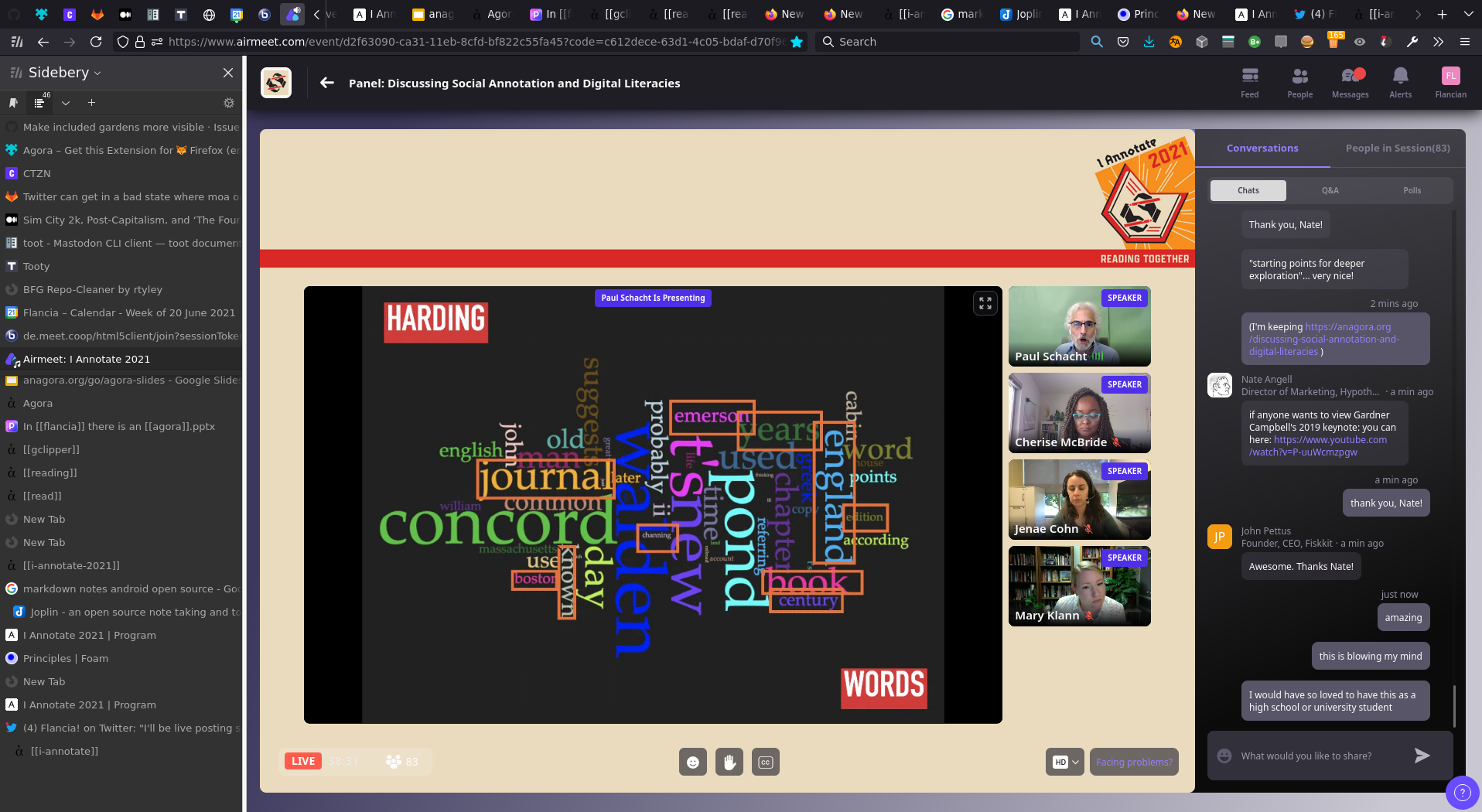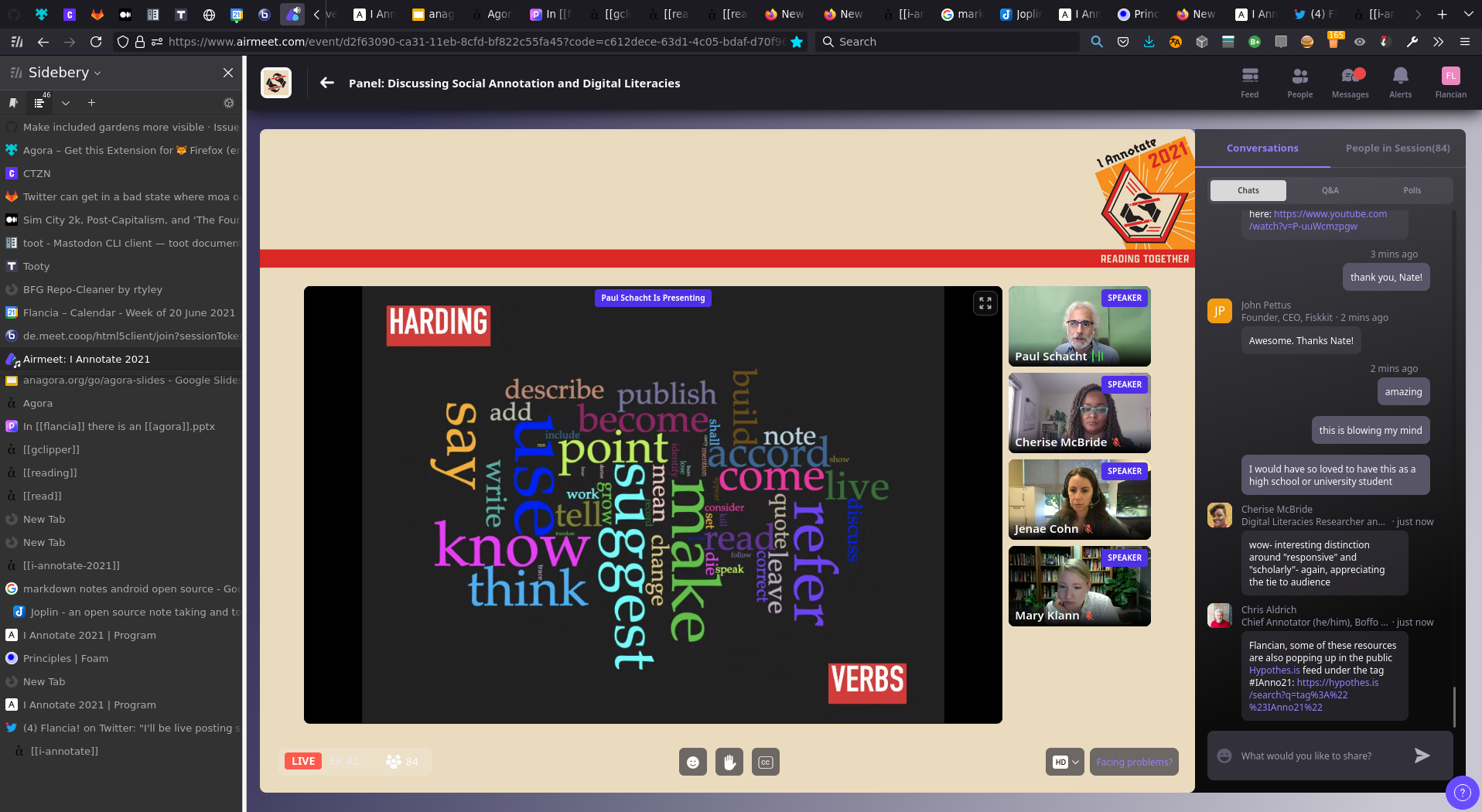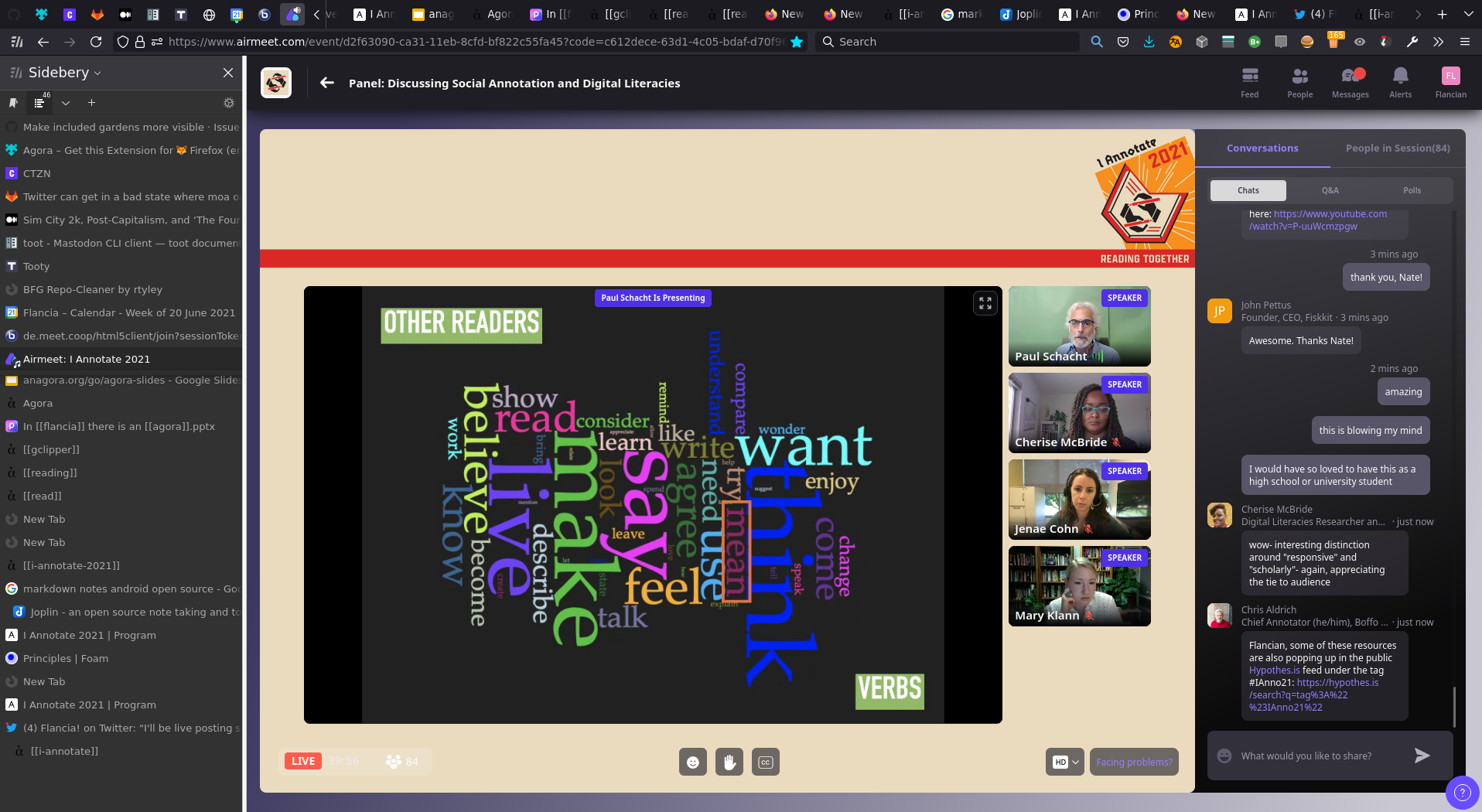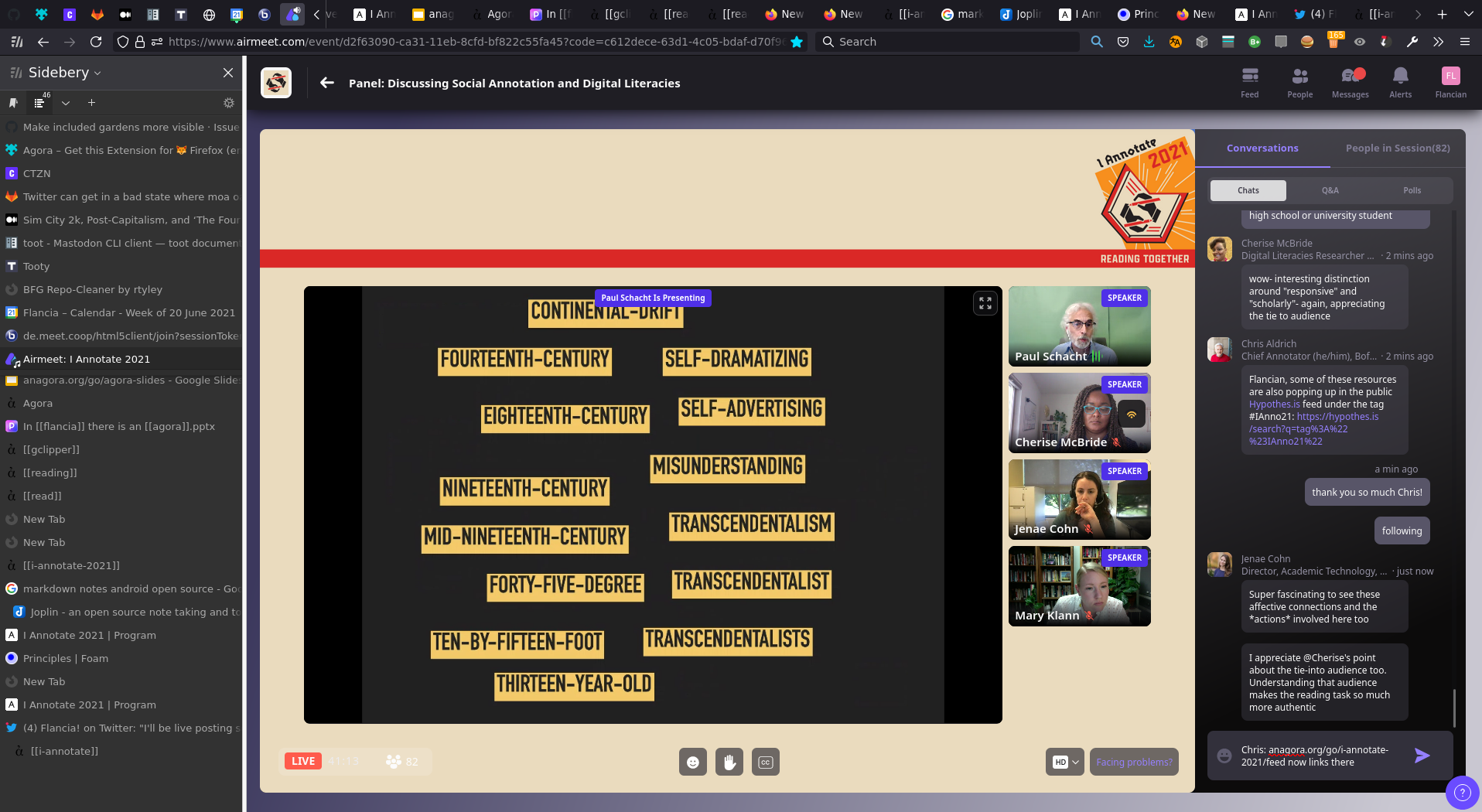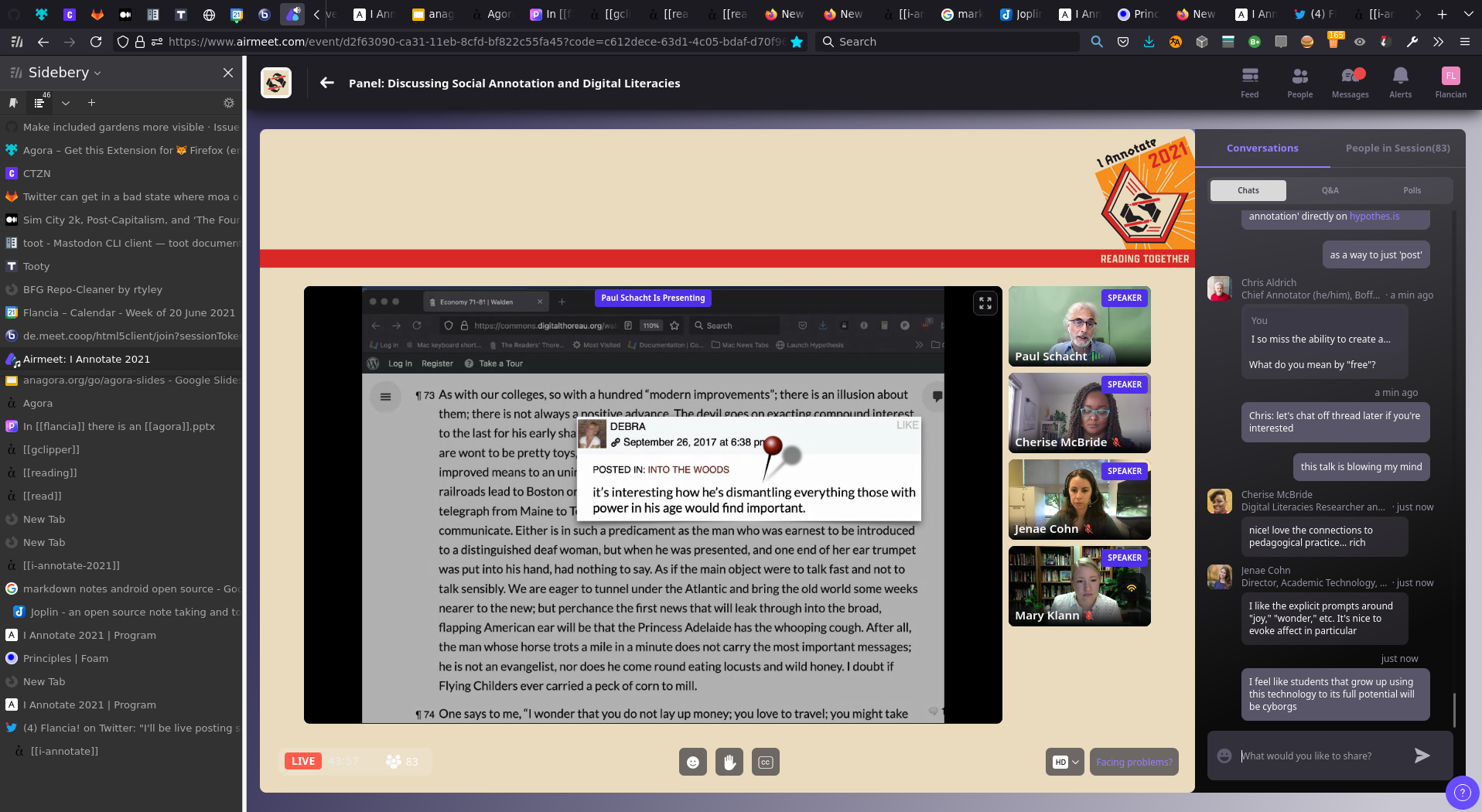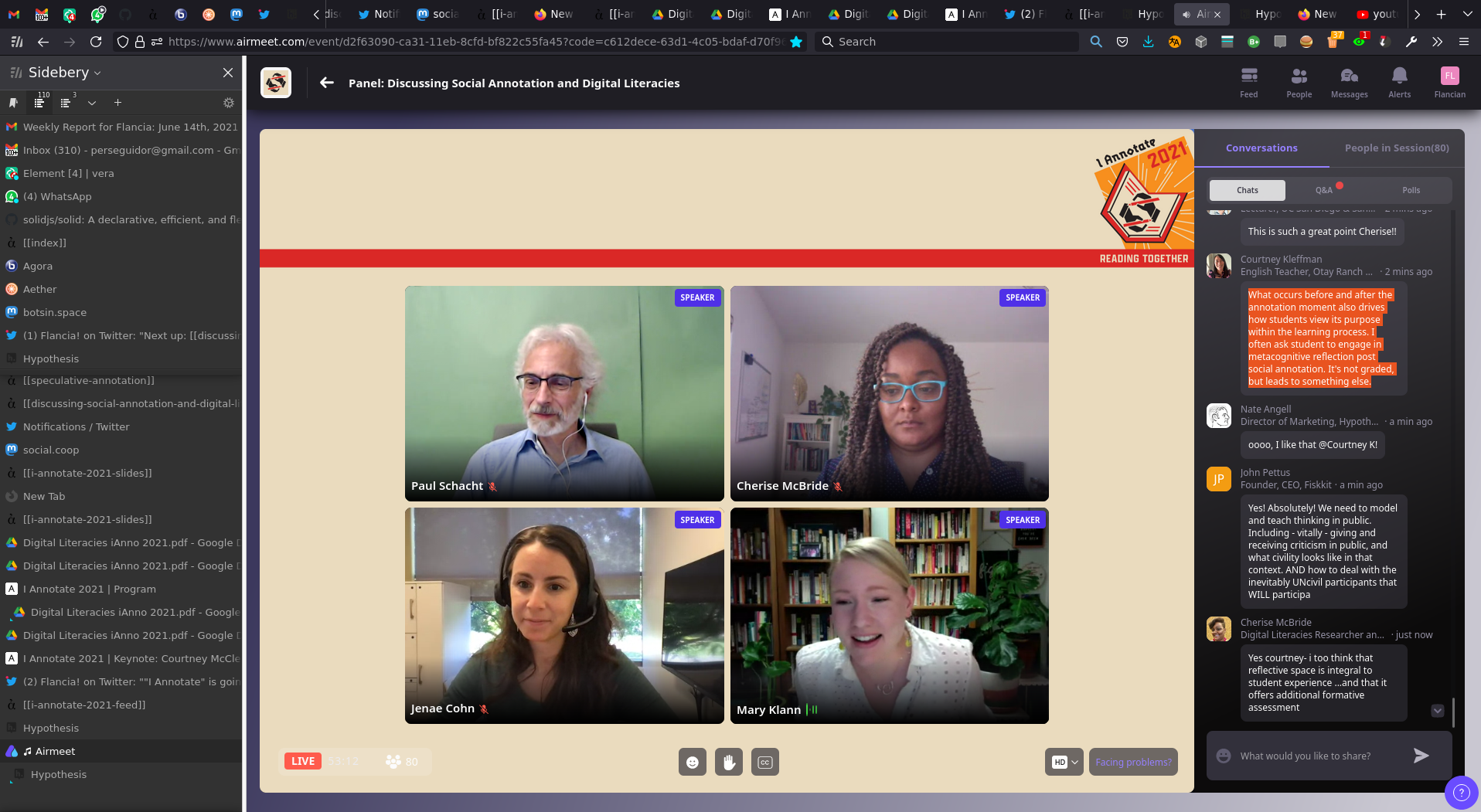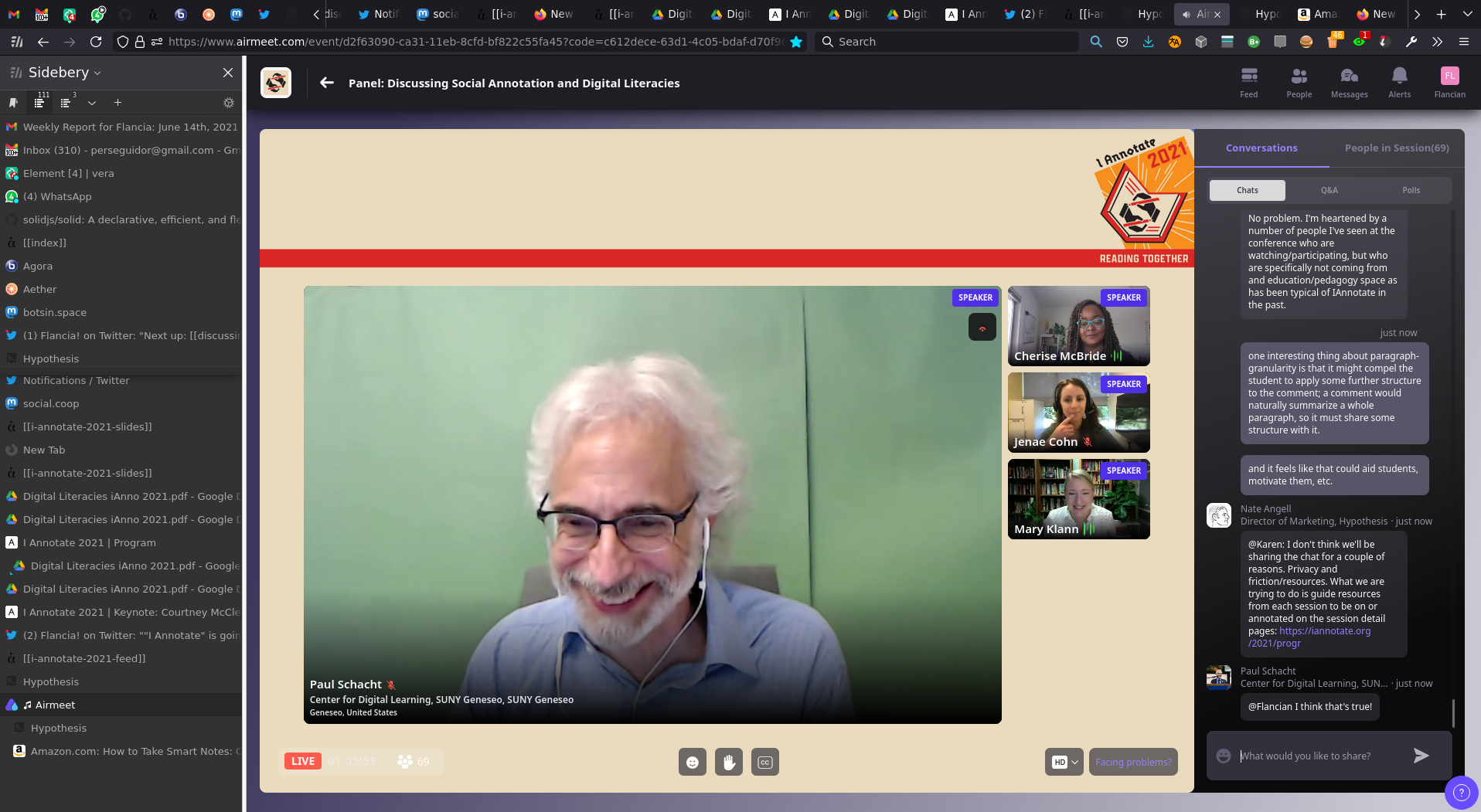-
a [[panel]]
- [[i annotate 2021]]
- [[slides]] https://drive.google.com/file/d/1EqIyenQPzfm_NMcJ63w6_TCeAXg5EG3f/view?usp=sharing
- [[nate angell]] introducing
-
[[mary klann]] with
- [[jenae cohn]] [[cherise mcbride]] [[paul schacht]]
- ten minutes per presenter
[[jenae cohn]]
- from [[california state university]]
"but what do I do with a reading?"
[[digital reading]]: 5 ways of engagement
"when you are sewing, you usually follow a [[pattern]]. if you are more of an expert like a [[project runway]] contestant, you use patterns to guide you. social annotation provides scaffolding to engage with digital text."
[[digital literacy]] development in three parts by [[coiro 2015]]:
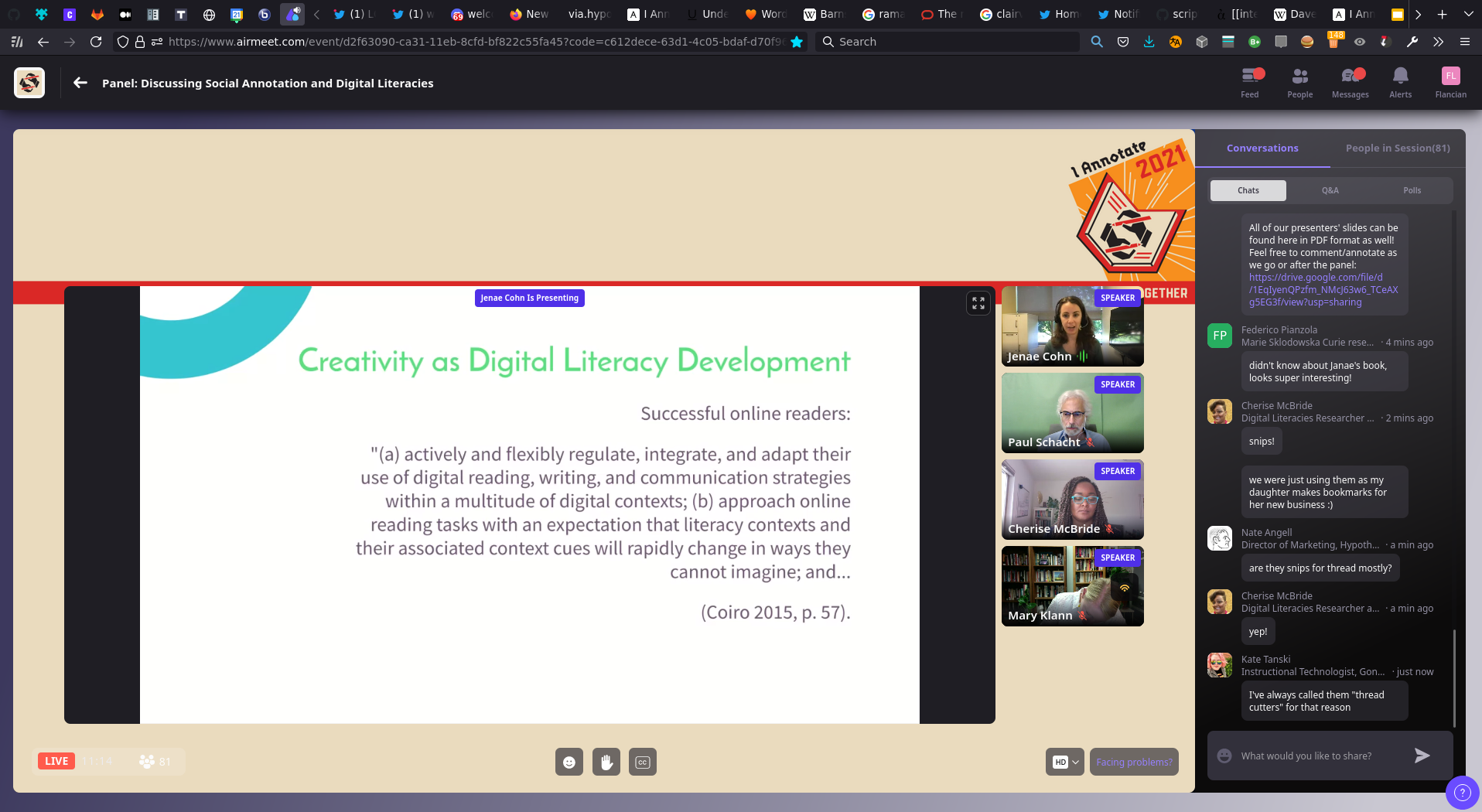
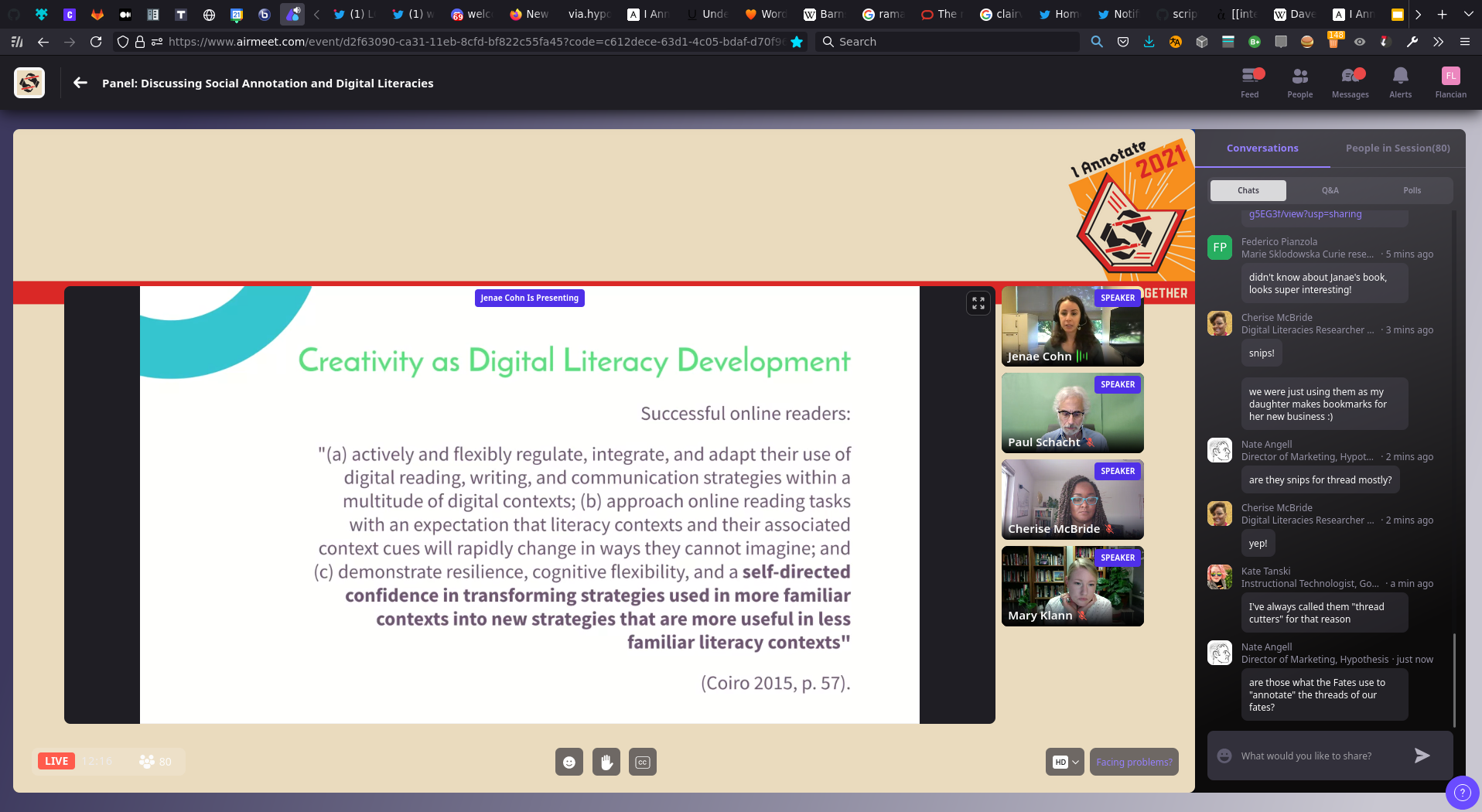
The most advanced users have "a self-directed confidence in transforming strategies used in more familiar contexts into new strategies that are more useful in less familiar literacy contexts."
Creation-driven prompts.
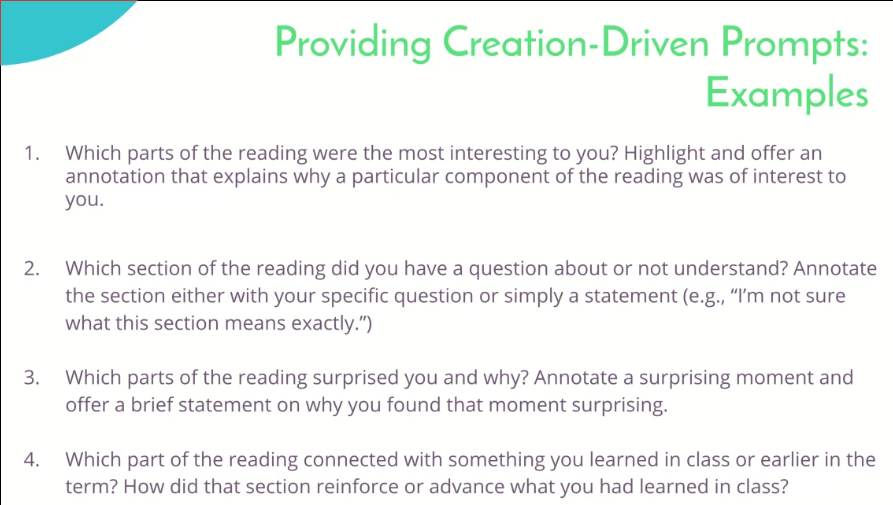
[[cherise mcbride]]
"making things visible: annotation and digital pedagogy"
It's an opportunity to have a conversation. It carries some [[risks]]. Social annotation is [[thinking publicly]]. Partnership with [[marginal syllabus]].
-
[[push]] [[marginal syllabus]]
- [[go]] https://margynalsyllab.us
- [[hypothes.is]] [[national writing project]] [[ncte]]
Why to annotate? "It's an [[act of love]] because of one's commitment to stay in relationship with the creator and other readers and observers."
Risks:
Collegiality:
(Missed some slides here due to technical problems.)
[[paul schacht]]
Ways of annotating: explicate contextualize argue converse connect message opine.
[[William James]]!
[[gardner campbell]] [[i annotate 2019]] on knowledge emotions: https://www.youtube.com/watch?v=P-uuWcmzpgw (thank you [[nate angell]]!).
Site was preseeded with annotated Walden:
[[word cloud]]:
Harding is interested in historical time, sees in numbers. More in the concrete than the abstract.
Debra's comment expresses a knowledge emotion plus says what's interesting about it, yet doesn't feel like a forced explanation:
[[prompts]] 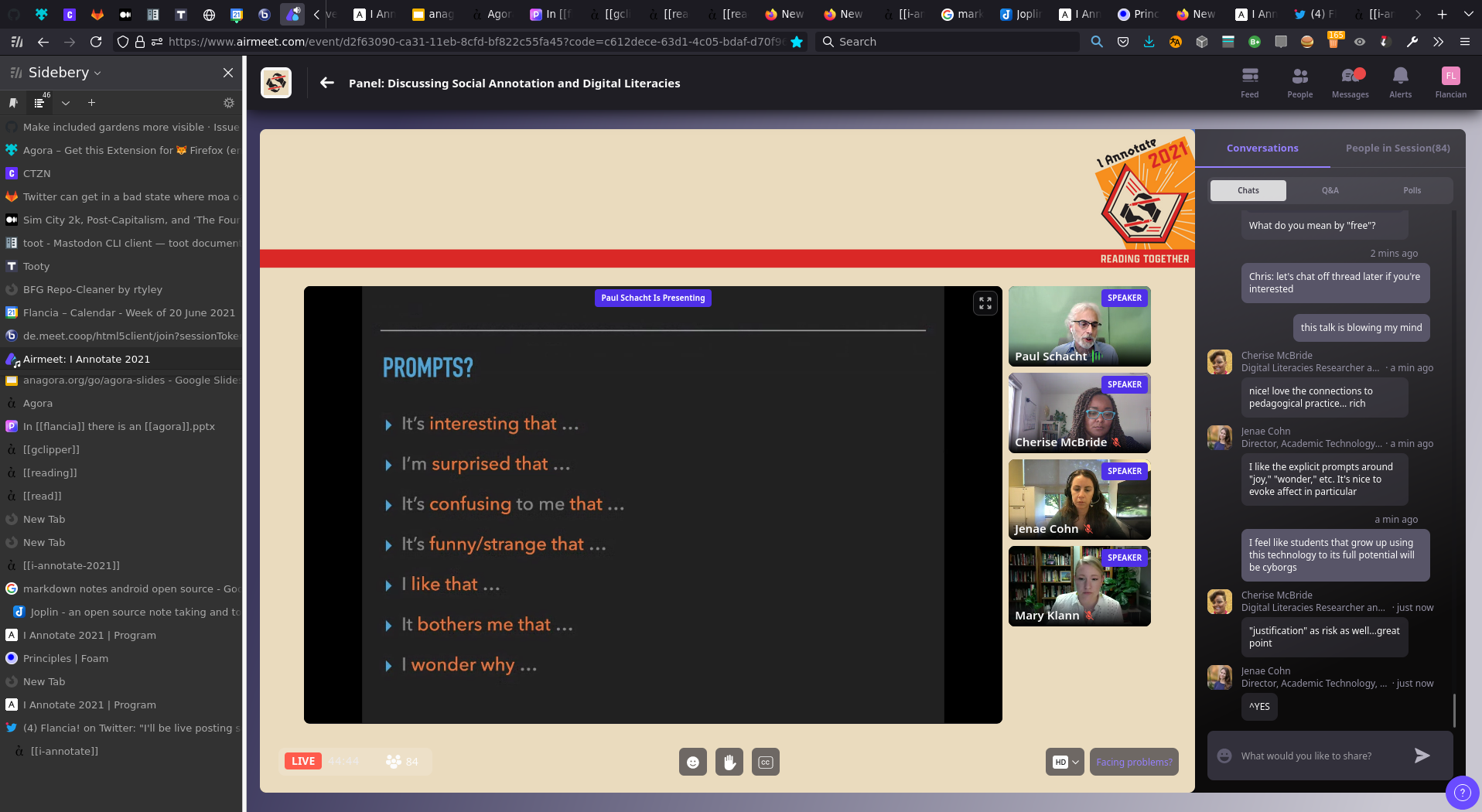
[[chris aldrich]] posted a feed: https://hypothes.is/search?q=%22reminds+me+of%22
[[courtney kleffman]]: "What occurs before and after the annotation moment also drives how students view its purpose within the learning process. I often ask student to engage in metacognitive reflection post social annotation. It's not graded, but leads to something else."
(great conversation in the panel and in the chat)
[[metacognition]] and [[reflection]].
[[paul schacht]] have them look at other people's annotations. Have students rifle through their own past annotations; marks in their books. Try to characterize the marks that they made; think about what they were trying to accomplish
What's your favourite annotation tool?
-
[[cherise mcbride]]
- private tool / [[LMS]] (sp?)
-
[[jenae cohn]]
- note there is implications for handling some of the PII
- advantages to do this behind a login wall (so in a silo?)
-
[[paul schacht]]
- [[google docs]] can work
-
whatever platform is being used, the important thing is for students to have control over their comments
- [[lms]] might support that
- [[hypothes.is]] supports group-only access
- there can be some 'showcase' posts, but not shared by default (I missed if this referred to a specific tool)
-
comment
- comments for [[wordpress]] are attached to paragraphs, not to arbitrary
- likes both ways for different reasons; sometimes at the paragraph level it can be easy to navigate
- (I agree)
- [[students]] have connected with [[scholars]]!
- [[cherise mcbride]] permission from authors is important
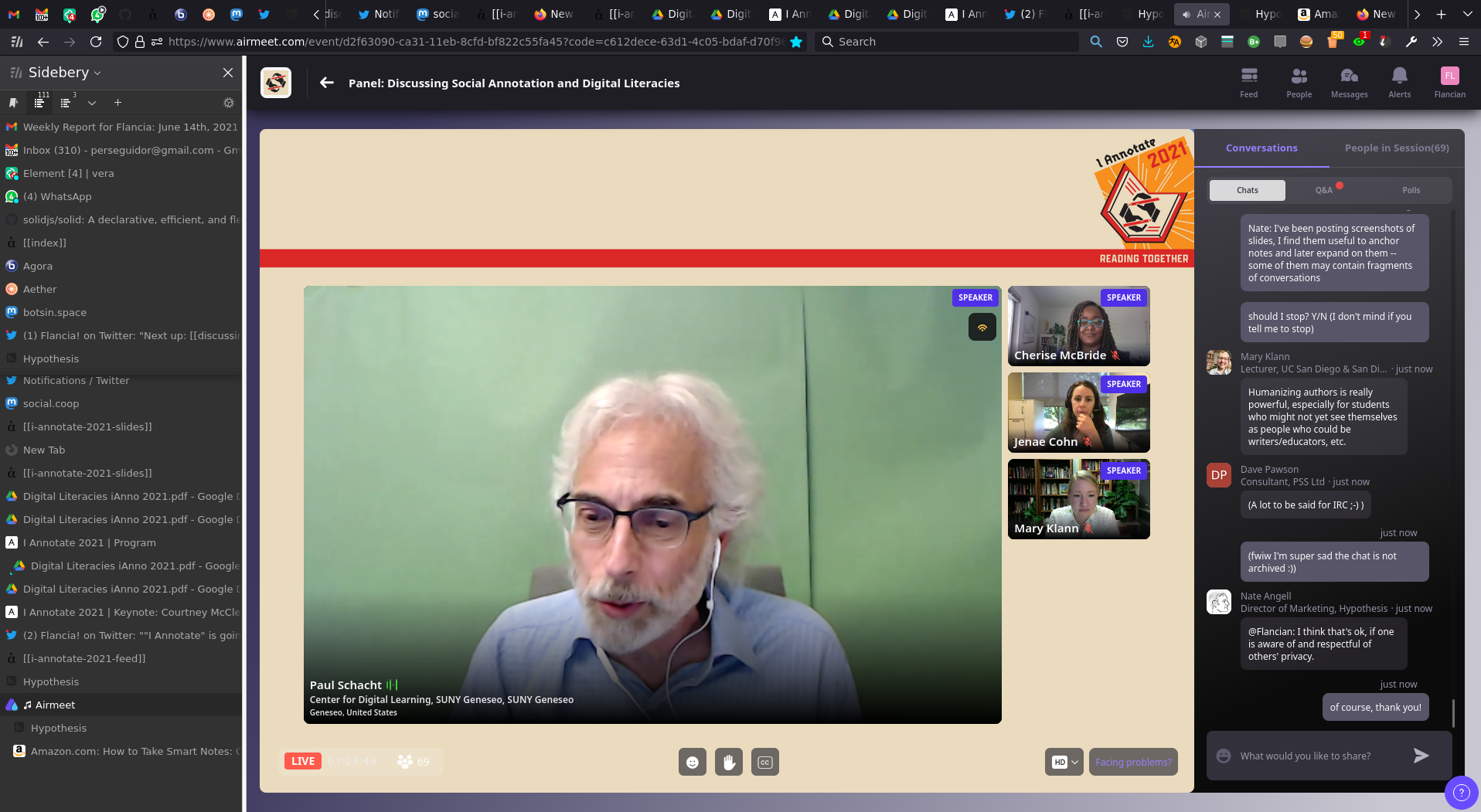
- [[nate angell]] [[frankenbook]]
-
[[jenae cohn]] importance of students truly owning their [[annotations]] and [[notes]]
- learn tools, both supported by the institution and personal
- [[cherise mcbride]] [[crowdlaaers]]
- [[jenae cohn]]
@Flancian, I see your question in the Q&A and may not have a chance to respond out loud. I'll typically put citation managers, note-taking tools (e.g. Evernote, Notion, OneNote) in the toolkit
citation mangers tend to be Zotero, Mendeley, and, when I've worked at institutions with librarians that support it, RefWorks and EndNote
-
[[paul schacht]] [[audrey waters]]'s piece objecting on the fact that people were writing [[hypothes.is]] comments on their blog
- disabled her comments because of abuse
- then people started leaving hypothes.is annotations, she was displeased with that
- [[chris aldrich]] https://indieweb.org/annotation#Criticism
-
[[flancian]]
- IMHO because there's no one size fits all, this implies that the moderation layer should be separate from the data/interlay layer
- essentially communities should run their own moderation layer
- as a [[commons]]
- public document at doc.anagora.org/discussing-social-annotation-and-digital-literacies
- video call at meet.jit.si/discussing-social-annotation-and-digital-literacies
